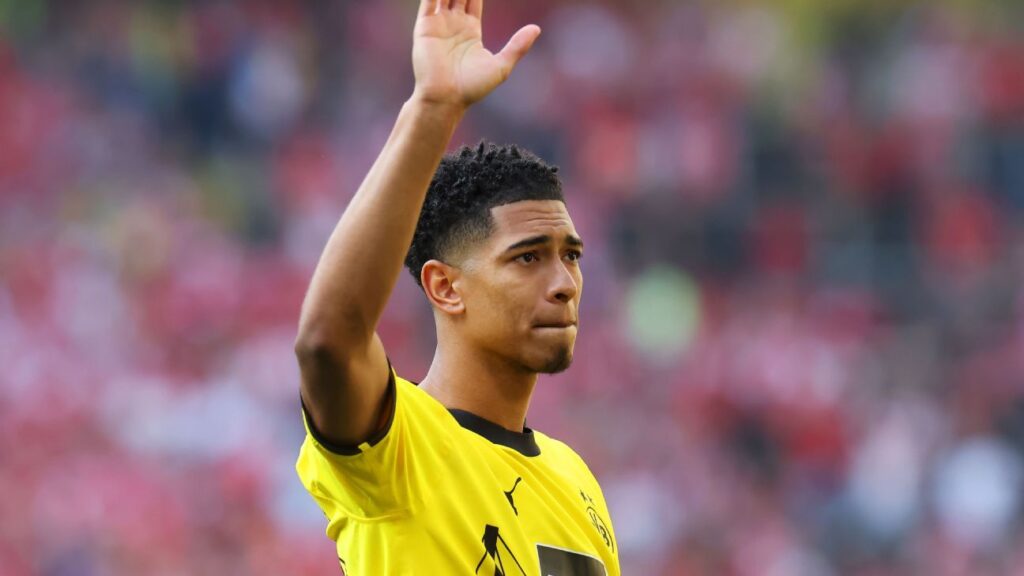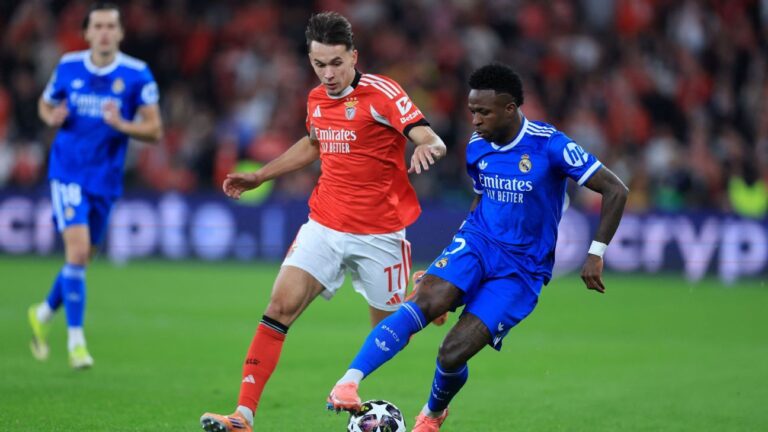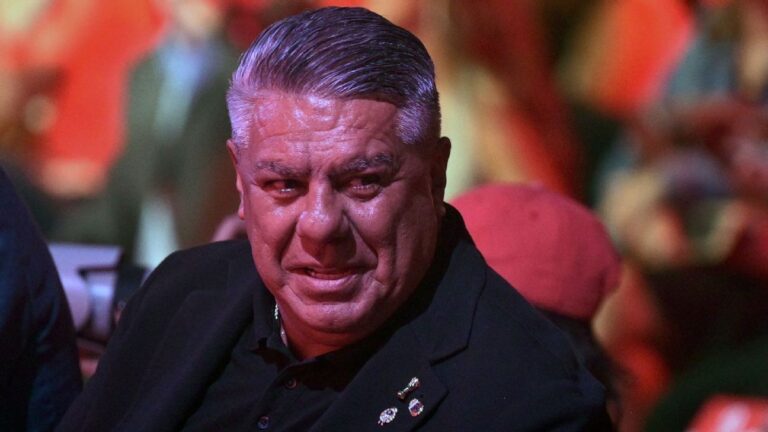Borussia Dortmund manager Edin Terzic was visibly enjoying the atmosphere during the club’s recent trip across the United States. The 40-year-old not only got a tan but also flashed his smile, which, for a while, had disappeared following Dortmund’s heartbreaking loss to Mainz on the final matchday of last season.
That defeat at the Signal Iduna Park ultimately cost the club the Bundesliga title, as Bayern Munich scored a late goal against FC Cologne to win it the Meisterschale for the 11th time in a row. Everyone, from players to coaches to executives, needed time to digest the events of that fateful afternoon, when virtually the entire city was ready to celebrate a title win.
What came after the conclusion of the 2022-23 campaign was another painful blow, albeit an expected one. Jude Bellingham, who was named Bundesliga player of the season, chose to go to Real Madrid for a transfer fee of roughly €103 million.
– Stream on ESPN+: LaLiga, Bundesliga, more (U.S.)
“It’s also part of our story,” Terzic said to ESPN FC of Bellingham’s exit. “So this summer, it’s Jude. The year before that it was Erling Haaland, and before that it was Jadon Sancho, before that it was Christian Pulisic. So there’ve been many key players, especially young key players, playing some great football for us and with us. And we always dealt with [their departures] really well.”
Dortmund’s higher-ups, including sporting director Sebastian Kehl, had drawn up two plans: one for a scenario in which Bellingham would have stayed with the club for another year, and one for the departure of the star midfielder. The scenario that ultimately played out left Dortmund with plenty of cash in their pockets, but a seismic hole in their midfield.
Kehl and Terzic remained realistic and did not try to find “a new Bellingham,” considering that the 20-year-old England international is a generational talent.
“As we did it in the past, it’s not about one person taking now the spot and trying to be the copy-and-paste version of somebody who left,” Terzic explained. “We are going to find our way, our balance to get, again, great players into this position.”
As such, Dortmund split up that nine-figure transfer fee and invested it into multiple players.
The first crucial decision Kehl and Hans-Joachim Watzke, the chief executive who is usually involved in transfer activities, had to make was to choose between incumbent Emre Can and Edson Álvarez of Ajax.
Can played a stellar second half of the season, during which he showed leadership skills and the ability to serve as a disruptive holding midfielder, frequently cleaning house behind Bellingham and Julian Brandt. Alvarez, the 25-year-old Mexico international who is a ruthless and intense holding midfielder, seemed intrigued by a move to Dortmund, but the Bundesliga side did ultimately not engage in talks with Ajax over a transfer and, instead, extended Can’s contract until 2026 and later picked him to be the new captain, succeeding Marco Reus.
Kehl and Terzic have put a lot of their eggs in one basket and that comes with a risk, as Can rarely played convincingly before January. The 29-year-old former Liverpool star can be erratic or overly aggressive in how he tries to defend the space in front of the back line. He picked up 11 yellow cards in 38 games across all competitions last season. Regardless of his shortcomings, Can will be the holding midfielder in Terzic’s 4-3-3 system.
After shying away from Alvarez, Dortmund instead focused on reinforcing the transitional position between Can and playmaker Brandt.
First, Kehl and Watzke signed Felix Nmecha for a surprisingly high transfer fee of €30m from VfL Wolfsburg. Even internally, it was felt that Dortmund overpaid for the 22-year-old Manchester City academy graduate.
What Nmecha offers are decent technical skills and intensity both in defensive as well as attacking phases. He can easily be employed as a box-to-box-midfielder, similar to Bellingham, although no one would dare to compare the quality of the two. Nmecha has the potential to become a starter for Dortmund at some point and even play a significant role in the Germany national team, but he will likely never be considered one of the best midfielders in the world.
For now, Terzic views Nmecha as a role player who can add his qualities when necessary and opportune. The man who has been appointed first choice to play that transitional role in Dortmund’s midfield is Marcel Sabitzer. The Austria international returned to Bayern Munich following a six-month loan stint at Manchester United, but Sabitzer did not see much of a future in Bavaria and even remarked that “there were things at Bayern that I did not like.”
Hence, Dortmund’s bosses smelled their chance to sign the 29-year-old from their archrivals. Bayern believe they are coming out of this deal the winners, as BVB paid a transfer fee of €19m — €4m more than Bayern sent RB Leipzig for Sabitzer in 2021.
At first glance, it doesn’t seem like Dortmund went into this transfer window with a clear-cut plan. They first showed interest in a holding midfielder and then opted to sign two midfielders who are comfortable in advanced positions and are best at ball progression. Watzke may have shed some light on Dortmund’s thought process.
The 64-year-old dealmaker talked about two goals for the future: Dortmund need to concede fewer goals and become “more stress resistant.” The latter indicates that the team have lacked a certain winning mentality on occasion. The chief executive himself criticised the players for what he considered a weak mentality minutes after they had drawn with VfL Bochum on matchday 30 of last season.
Whether mentality will be the key to dethrone Bayern remains to be seen. Watzke worked closely with Jurgen Klopp during the manager’s seven-year stint at Dortmund, and ever since has been a huge admirer of the way Klopp can motivate a team. Terzic, on the contrary, is a more soft-spoken head coach who usually allows his players to make the pre-match motivational speech.
Perhaps the mentality that Watzke desires has to come from inside the locker room, with new players being added to the squad. Besides Sabitzer and Nmecha, Dortmund also signed Ramy Bensebaini on a free transfer after the left-back’s contract with Borussia Monchengladbach expired in June. The 28-year-old Algeria international is also considered to have a strong mentality.
“At the one side, we want to develop young players like Karim Adeyemi or Jamie Bynoe-Gittens, or now he’s injured, Julien Duranville, or some others,” Watzke said during a roundtable with media this week. “At the other side, to compete and to have success in the Champions League and that, we must sign two or three players with a lot of experience, like we did in the past.”
What can be said of Dortmund’s transfer activity is that they have focused on familiar names rather than unknown youngsters, rolls of the dice on prospects like Soumaila Coulibaly or Abdoulaye Kamara, as they had done in the past. Dortmund have gained a reputation as a star factory, with Sancho, Haaland and Bellingham being the most prominent examples from recent years. Two players who could join that group of names at some point in the future are Bynoe-Gittens and Duranville.
Bynoe-Gittens is a winger who joined Dortmund from Man City’s academy last summer. The 18-year-old England youth international made 19 Bundesliga appearances last season, with two shoulder injuries keeping him out of action for considerable stretches.
Meanwhile, Duranville, another winger, made his first league debut in Dortmund’s season finale against Mainz. The 17-year-old Belgium youth international and former Anderlecht academy standout witnessed the heartbreak from the turf of the Signal Iduna Park, but that won’t derail his progress, as Terzic and Kehl have a high opinion of him.
The third member of the group of young attacking players in Dortmund’s squad remains Youssoufa Moukoko. He once entered the scene as a much-discussed wunderkind but has not managed to claim a spot in Dortmund’s starting XI.
At 18, Moukoko still has plenty of time to progress, but what could hold him back is his profile. He is neither tall nor fast and is best used as a secondary striker behind a large target player like Sébastien Haller, but Terzic doesn’t prefer a two-striker system and instead wants to employ a more traditional playmaker like Brandt behind Haller.
“Youssoufa is a young, very talented player,” Terzic told ESPN. “He’s now for many years with us. He’s with the first team, I think he’s starting now his third season. But he’s also very young. And especially if you talk about the No. 9, he’s playing with the stopwatch because if he’s not scoring, everybody’s ticking, and counting the minutes that he didn’t score. And we try to put this by side and not judge him on scoring goals, we are judging him in improving our game, in improving the players next to him. And he’s on a great, great way and we are really happy that he’s part of our team.”
For the first half of last season, it was unclear whether Moukoko would sign a new contract, with his existing deal expiring at the end of the campaign, as he demanded a high salary and contemplated leaving Dortmund. Internally, opinions on whether Dortmund ought to commit to Moukoko were divided. In January, he signed a new contract that runs until 2026, although reports suggesting that he might leave the club remain, given that there is no natural role for Moukoko in Terzic’s system.
In the short term, Dortmund are trying to challenge Bayern with mentality players like Sabitzer and Bensebaini and wipe away the memory of that loss on last season’s final matchday, yet they are still focussed on the longer view of developing the next generation of stars that may soon have their breakout moment.
“Our role in football is to develop one of the best football players in the world,” Watzke said. “We developed Robert Lewandowski. We developed Erling Haaland. Now we developed Jude Bellingham.”
In May, Dortmund hired Slaven Stanic as their “sports coordinator.” The 48-year-old former veteran of the 2. Bundesliga had worked for Projekt B, an agency that advises Klopp, among others. Stanic is well connected to players, agents and executives in Germany and beyond, and was hired to open doors for the club.
Meanwhile, Dortmund also employ three heads of scouting, with Laurent Busser being stationed in France, where Dortmund unsurprisingly sense the next great wave of talents coming. The 53-year-old Frenchman worked for Bayern between 2018 and 2022, joining Dortmund last summer and being promptly promoted to serving as one of the club’s scouting heads.
Busser, like Sabitzer this summer and Niklas Süle the summer before, decided to leave the record champions to work for their challengers. Leaving Bayern might not have been the dream scenario for these men, but they and many others in and around the Signal Iduna Park want nothing more than to dethrone Bayern after 11 long years.




